This comprehensive guide delves into the latest trends, requirements, and updates in the Florida medical license landscape. From the surge in licensed healthcare practitioners to the evolving telehealth regulations, we cover all you need to know to stay informed and compliant in 2023.
Florida Medical Licensing Trends
Florida is witnessing a remarkable demographic shift. Since 2021, the state’s population has grown by 1.9 percent, making it the fastest-growing in the nation. This rapid expansion directly impacts the healthcare sector, particularly in the realm of medical staffing. With such a dynamic population increase, the challenge for Medical Quality Assurance (MQA) is significant: they are tasked with ensuring that the state’s 1.4 million healthcare practitioners can commence and continue their work efficiently, minimizing any delays in licensing.
According to The Annual Report and Long-Range Plan for Fiscal Year 2022-23, the MQA licensed over 128,000 new healthcare practitioners with an average processing time, recorded at an impressive 0.09 days per license.
Over the past six years, there’s been a steady increase of 3.4% in total licensure for practitioners, growing from 1,245,454 to 1,478,142. This fiscal year, the Board received 152,581 initial applications and issued 128,167 initial licenses. Furthermore, the period saw a record-breaking number of renewals, with 610,818 licenses renewed, marking the highest in this reporting cycle.
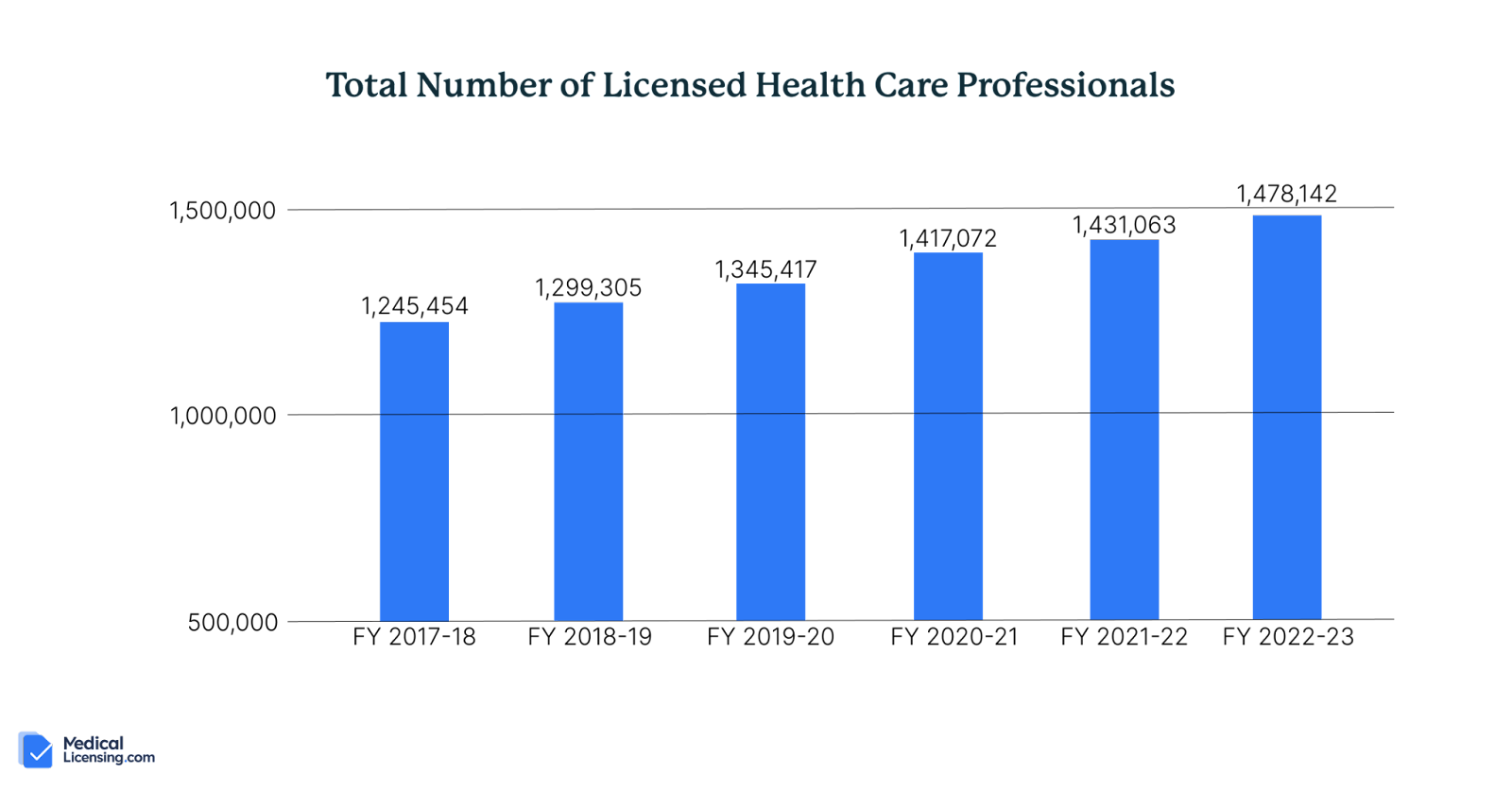
Leading the way are registered nurses, certified nursing assistants (CNAs), medical doctors, licensed practical nurses, and registered pharmacy technicians.
A closer look at the growth trends reveals some compelling insights. In the past five years, the field of registered nursing has seen a significant surge, growing at a rate of 4.3%. This makes registered nursing the fastest-growing healthcare profession in Florida. The demand for medical expertise is on a steady rise, with medical doctors and pharmacy technicians also witnessing considerable growth, marked by six-year growth rates of 3.6% and 2.4%, respectively.
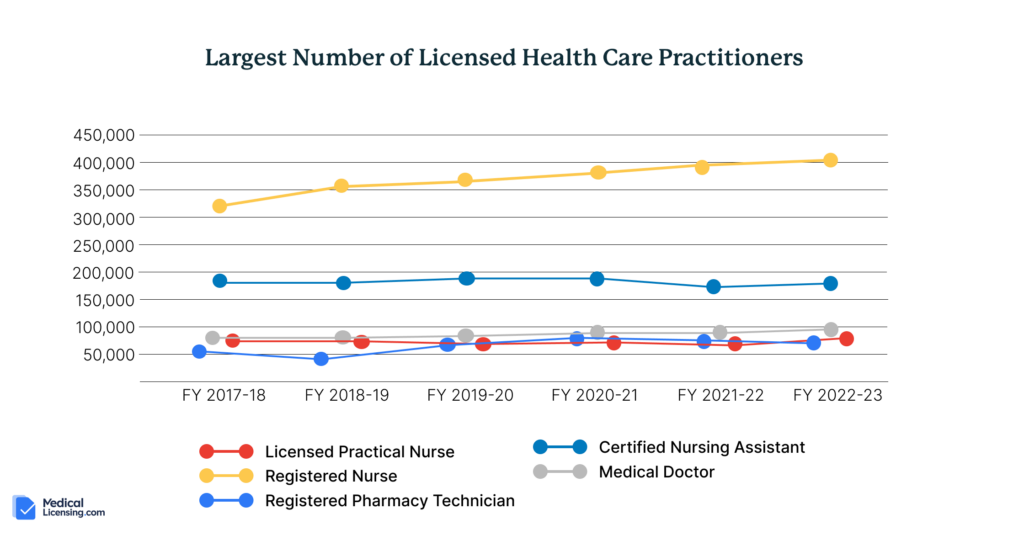
The Medical Quality Assurance’s (MQA) role extends beyond just licensing healthcare practitioners. A critical part of their mandate includes the licensing of healthcare facilities and continuing education (CE) providers, integral components in maintaining the high standards of healthcare services in the state.
The fiscal year 2022-23 has seen MQA license a significant number of facilities – 24,460 to be precise. This marks a 4.6% increase compared to the previous year, aligning with the expected trends influenced by the biennial renewal cycle. Such data points highlight the proactive steps taken in expanding and maintaining the state’s healthcare infrastructure.
Interestingly, despite the number of licensed facilities in Florida showing a steady trend, with a modest increase of 1.4% over the last six years, there’s a notable shift in the realm of continuing education. The CE application rate has witnessed a growth of 3.1%. This increase reflects the growing emphasis on continuous learning and development within the healthcare sector, a trend that underscores the commitment to excellence and adaptability in Florida’s healthcare services.
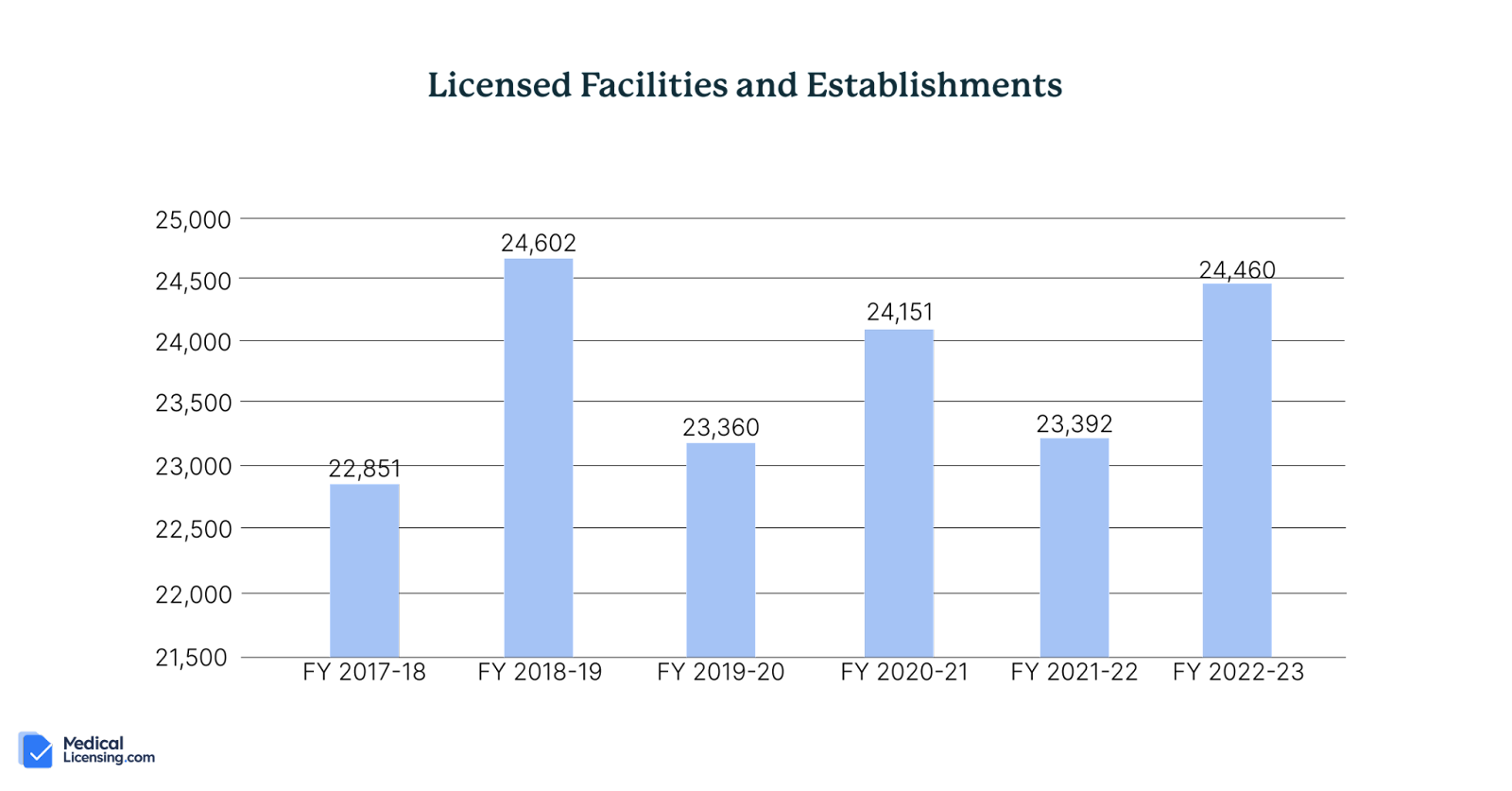
The Medical Board of Florida
The Florida Board of Medicine plays a pivotal role in maintaining the high standards of medical practice across the state. It operates with a clear mission: to ensure that every physician practicing in Florida meets the essential requirements for safe and competent practice. Recognizing that the practice of medicine is a privilege granted by the state, the Board is committed to its responsibilities of licensing, monitoring, disciplining, educating, and rehabilitating physicians and other practitioners.
Contact Information:
- Phone: (850) 245-4131
- Fax: (850) 488-9325
- Email for MD queries: [email protected]
- Email for OD queries: [email protected]
- Board Website: Florida Board of Medicine
- Nursing Board: Florida Board of Nursing
In its pursuit of innovation and efficiency, the Florida Department of Health’s Division of Medical Quality Assurance (MQA) is set to transform the licensing experience for healthcare practitioners. Starting in mid-2023, the transition to electronic licenses (e-licenses) will replace the traditional method of printing and mailing paper-based licenses. This shift marks a significant step towards modernizing and streamlining the licensing process.
Florida law mandates that an initial application be reviewed within 30 days. The Board aims to process licenses swiftly, targeting 1-3 days for specific categories like Anesthesiologist Assistants and Physician Assistants, and 8-10 days for Medical Doctors (MDs).
However, applicants should anticipate an overall processing time of two to six months from application receipt. Factors such as malpractice claims, disciplinary actions, arrest records, extensive employment, or state licensure history can contribute to delays.
Florida Medical License Application and Requirements
The process of obtaining a Florida medical license is both comprehensive and meticulous, designed to uphold the highest standards of medical practice in the state. The 27-page application is structured to gather detailed information, ensuring that every licensed practitioner meets the rigorous criteria set forth by the Florida Board of Medicine.
Florida Medical License Application Overview
The Florida medical license application delves into several key areas:
- Personal Identification: This section requires precise details about the applicant’s identity and legal residence. Applicants must provide government-issued identification and proof of residence to establish their eligibility.
- Educational Background: The application requires detailed information about the applicant’s medical education. This includes verification from the Federal Credentials Verification Services (FCVS) of medical school transcripts, diplomas, and school verification. This verification is essential to ensure the applicant’s educational qualifications meet the Board’s standards.
- Employment History: A comprehensive record of the applicant’s professional journey, including locations, durations, and the nature of medical practice, is essential. This history provides insight into the applicant’s experience and professional trajectory.
- Health and Criminal History: Applicants must disclose any criminal history, with specific guidelines on convictions that could affect licensure. Those with health issues must provide a self-explanation and a physician’s letter detailing their ability to practice safely. Disciplinary history also requires detailed explanation and documentation.
- Malpractice and Liability Claims: Applicants involved in malpractice suits must be prepared to provide additional information. The application status can be checked online, and it is advised not to make any commitments based on expected licensure until it is officially granted. The process can take two to six months
Florida Medical License by Endorsement: Requirements include being a graduate of an allopathic US medical school or an international medical school with an ECFMG certificate and completion of residency training. Applicants for a Florida medical license must pass a national examination (NBME, FLEX, or USMLE) and either have actively practiced medicine for two of the past four years or completed a board-approved clinical competency examination or postgraduate training program recently
We also have a whole section on getting a medical license in the state of florida, where you can additionally find out all the information you need.
Licensure History
Florida medical license applicants with a history of revoked, suspended, or probated licenses must provide detailed explanations. This transparency is crucial for the Board to assess the applicant’s fitness for practice.
Verification and Examinations
- Medical Degree Verification: Verifying the medical degree directly from the issuing institution is a vital step, in confirming the authenticity of the applicant’s educational qualifications.
- Postgraduate Training: Applicants must provide verifiable details of their residency or other postgraduate training programs, including contact information of the institutions. The needed amount — 1 year and 2 years IMG Minimum Postgraduate Training
- Examination Scores (USMLE or COMLEX): Proof of passing these standardized exams is required, as they are critical benchmarks of medical knowledge and competency.
- Florida Laws, Rules, and MPJE: Applicants must demonstrate knowledge and understanding of Florida’s medical laws and rules, including passing the MPJE, to ensure they are prepared to practice within the state’s legal framework.
- Background Check: Applicants must submit fingerprints via a Livescan service provider for a criminal history background check. This screening is crucial and applicants bear all costs
The introduction of HB 1133 marks a significant change, especially for physician assistants. It revises the eligibility criteria for PA licensure, accommodating those who matriculated into approved programs by the end of 2020. Moreover, it allows licensing for PA applicants who pass the certifying exam but may not meet certain educational standards.
Florida’s Healthcare Standards: CE Providers and License Renewals
In the fiscal year 2022-23, the Medical Quality Assurance (MQA) received 566 applications from CE providers, approving 553 of them. This process is governed by stringent Florida laws and statutes, ensuring that the CE courses offered align with the state’s high standards and cater to the evolving needs of healthcare professionals. These approved providers are instrumental in delivering quality education that informs and updates healthcare workers on critical medical advances.
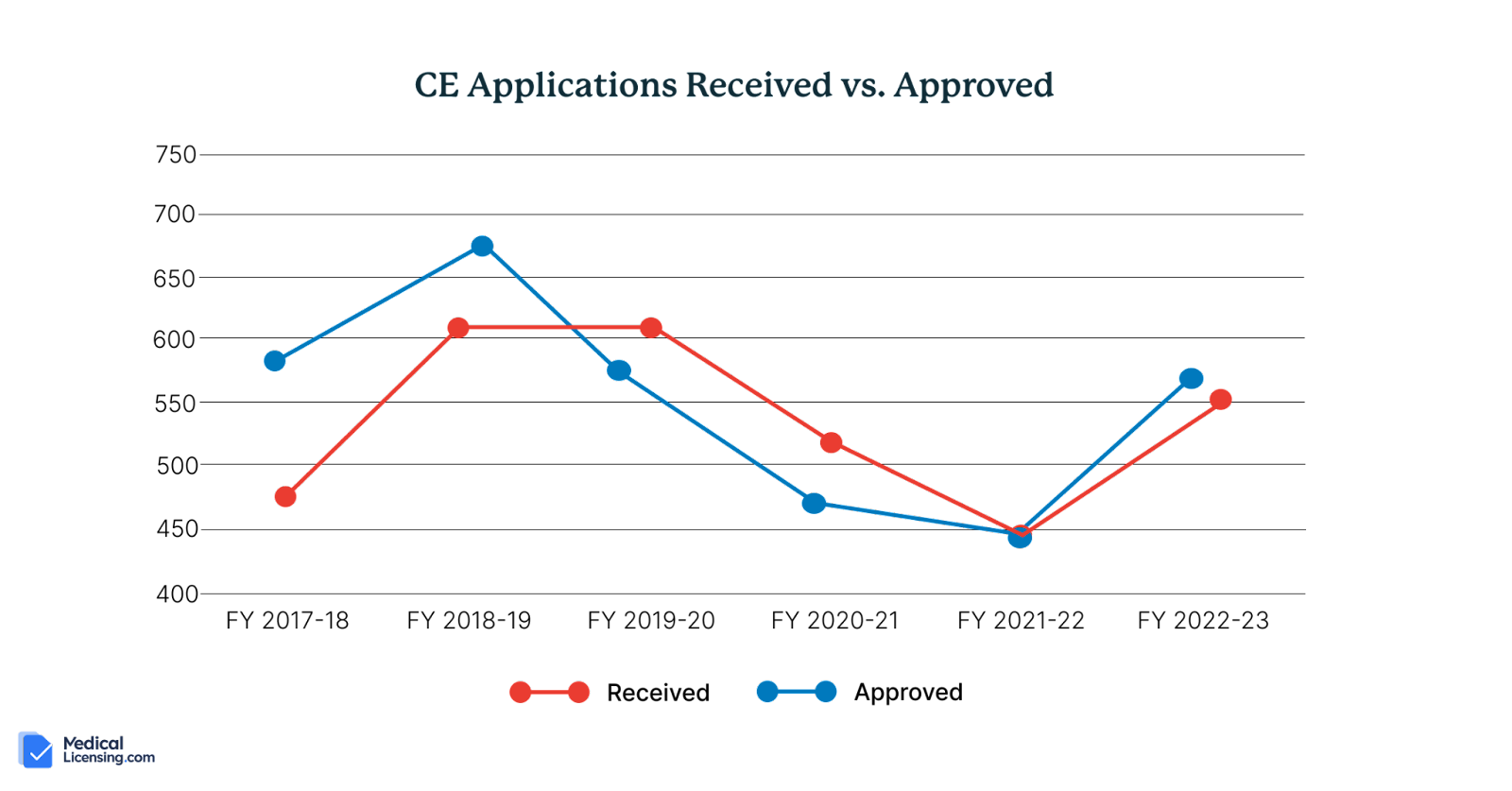
Another key aspect of professional development is the upgrading of healthcare licensure and certifications post-initial licensure. A record number of upgrade applications were received and processed this year – 30,137 received and 26,655 issued. This marks a significant increase of 73.1% in license upgrades compared to five years ago (26,655 in FY 2022-23 versus 15,394 in FY 2018-19).
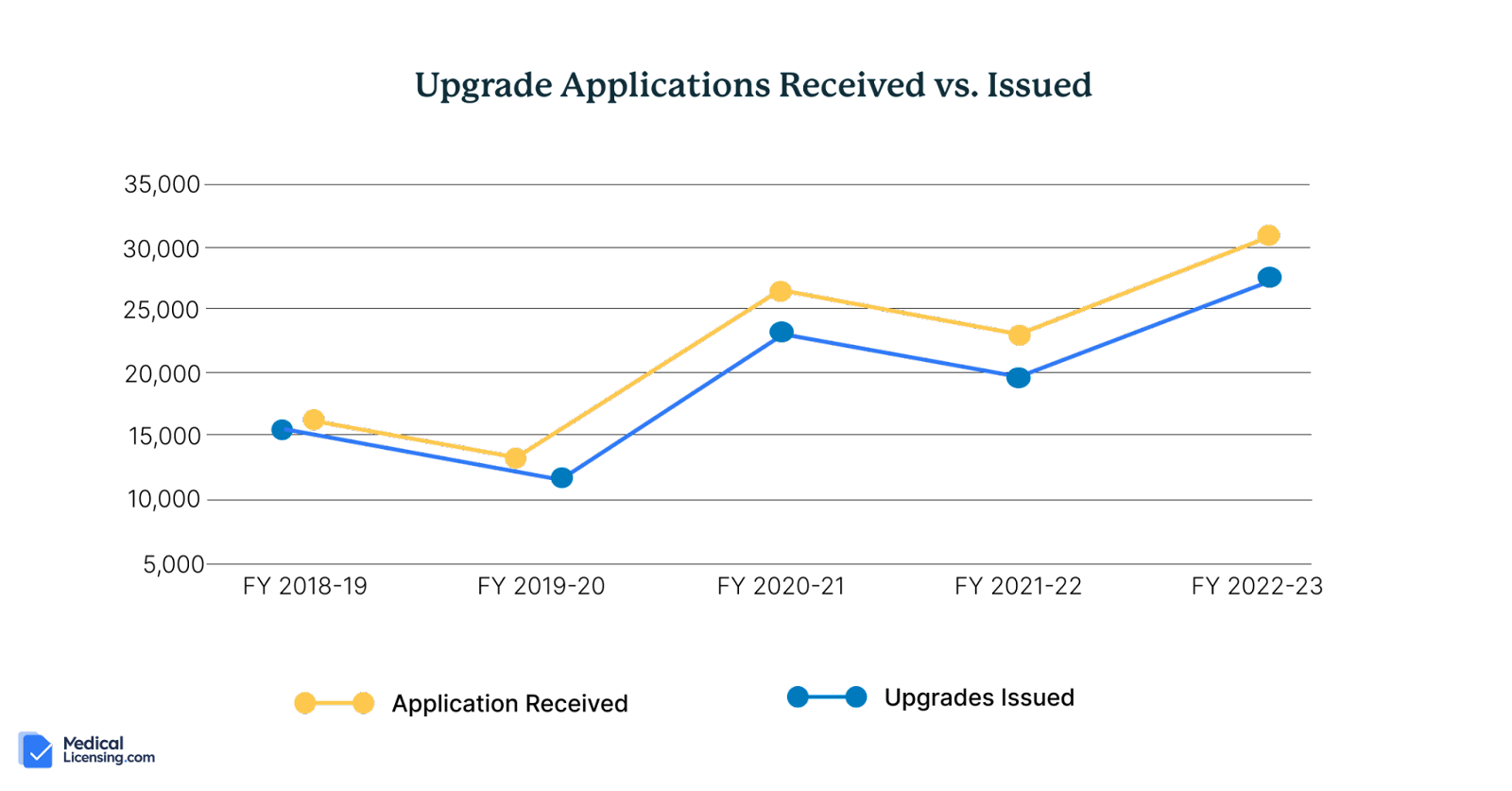
Nursing stands out as the profession with the highest percentage of license upgrades, accounting for 52.5% of all upgrades. This translates to 14,002 nurses, including Advanced Practice Registered Nurses (APRNs), Licensed Practical Nurses (LPNs), and Registered Nurses (RNs), who have elevated their practice. Following closely, the pharmacy sector accounts for 43.7% of the professional upgrades. A total of 11,652 pharmacists and registered pharmacy technicians have received certifications empowering them to take on more direct patient care roles. These upgraded certifications include the authority to administer immunizations, engage in collaborative practice with physicians, and conduct point-of-care testing and diagnostic services for minor, nonchronic health conditions (test and treat).
Florida Department Of Health CME Requirements for License Renewal
The State of Florida mandates that physicians must accrue at least 40 CME credits for each biennial license renewal cycle. However, for those undergoing their first license renewal, the requirement is notably lower, with only three hours of CME credits needed.
It’s important to note that medical licenses in Florida are biennial, necessitating the completion of these educational requirements every two years. The licenses expire annually on January 31, with Group 1 licenses expiring in even-numbered years and Group 2 in odd-numbered years. This structured timeline ensures a continuous updating of skills and knowledge in the ever-evolving medical field.
The Florida Board of Medicine has set specific CME hour requirements for the first biennium renewal. In addition, the Florida State Medical Board outlines further criteria for the second renewal and subsequent renewals thereafter. These requirements, detailed by the Board, are designed to uphold the highest standards of medical practice and patient care in the state.
| Requirement | MD (Medical Doctor) | DO (Doctor of Osteopathic Medicine) |
| General CME Hours | 40 hours every biennium | 20 AOA Category 1-A CE-related credit hours in general osteopathic medicine topics every biennium |
| Prevention of Medical Errors | At least 2 hours in either Category 1 or Category 2 every biennium | 2 hours every biennium |
| Controlled Substance Prescribing | 2 hours of AMA Category 1 or AOA Category 1-A every biennium (for MDs with controlled substance prescribing license) | 1 hour every biennium in federal and state laws related to controlled substance prescribing |
| Domestic Violence Program | 2 hours in either Category 1 or Category 2 every third renewal | 2 hours every third biennial renewal |
| Professional and Medical Ethics Education | Not specifically required | 1 hour every biennium |
| Florida Laws and Rules for Medical Providers | Not specifically required | 1 hour every biennium |
| HIV/AIDS Courses | Not specifically required | 1 hour during the first biennial renewal |
Every third renewal requires MDs to complete a full 40 hours of CMEs, with at least two of those CMEs being in a Category 1 or Category 2 prevention of medical errors program as well as two hours in a Category 1 or Category 2 domestic violence program.
Advancements in Florida Telehealth: Key Changes
Florida’s telehealth landscape is set to evolve with new regulations coming into effect on July 1, 2023, as outlined in HB 267. This bill significantly expands the definition of telehealth, now including audio-only telephone calls in the telehealth technology authorization statute, a development that aligns with contemporary healthcare needs.
Telehealth in Florida for Out-of-State Providers
The bill specifies that out-of-state telehealth provider registration is exclusively for healthcare practitioners licensed outside of Florida. Those already licensed in Florida are permitted to provide telehealth services to in-state patients.
To qualify for an out-of-state telehealth provider registration, healthcare practitioners must:
- Submit a completed Application for Out-of-State Telehealth Provider Registration.
- Hold an active, unencumbered license from another state, the District of Columbia, or a U.S. possession or territory, with required license verification.
- Have a clean professional record with no pending investigations, disciplinary actions, or license revocations in the last five years.
- Designate a registered agent in Florida for service of process (details in the application form).
- Maintain liability coverage or financial responsibility for telehealth services in Florida, meeting or exceeding the state’s requirements for healthcare practitioners.
Avoid opening a physical office in Florida and not provide in-person healthcare services to patients in the state.
It’s important to note that only physicians licensed in Florida may provide telehealth services. Physicians from other states must register with the Florida Department of Health. Additionally, prescribing restricted medications via telehealth requires a current DEA license, which involves an online application process and a background check.
Summing Up
As we’ve explored, the Florida medical licensing landscape in 2023 is marked by significant developments and ongoing advancements. Staying abreast of these changes is vital for healthcare professionals and facilities operating in the state. By understanding the detailed requirements, embracing the new telehealth opportunities, and adhering to the updated CME guidelines, medical practitioners in Florida can ensure they provide the highest standards of care while remaining compliant with state regulations. As the healthcare environment continues to evolve, staying informed and adaptable is key to thriving in Florida’s dynamic medical field.
FAQs About Florida Medical License
-
What are the Florida medical license requirements?
In 2023, Florida medical license requirements include completing 40 CME credits every two years, with specific courses in medical error prevention and, for some practitioners, controlled substance prescribing. New applicants must submit detailed information on their educational background, employment history, health and criminal history, and malpractice claims. The introduction of HB 1133 has also updated eligibility for physician assistants, allowing licensure for those meeting certain criteria, including passing the certifying exam. -
How has telehealth regulation evolved in Florida?
Telehealth regulation in Florida has expanded significantly in 2023. As per HB 267, the definition of telehealth now includes audio-only telephone calls. Out-of-state telehealth providers can register to offer services in Florida, provided they meet specific criteria such as holding an active, unencumbered license from another state and maintaining liability coverage. However, Florida-licensed physicians are still required to register with the Florida Department of Health to provide telehealth services. -
What is the average processing time for a Florida medical license?
The average processing time for a Florida medical license in 2023 is impressively quick, averaging around 0.09 days per license as per the Medical Quality Assurance’s report for the fiscal year 2022-23. However, applicants should anticipate an overall processing time of two to six months, considering factors like background checks, employment history, and any disciplinary actions.



